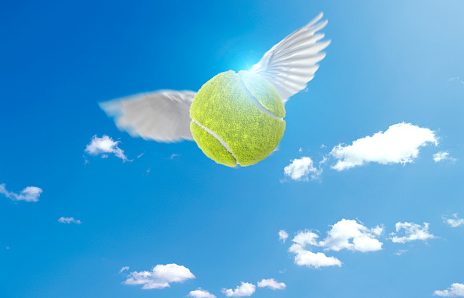That’s a load of balls (Credits: Getty Images)
If you’ve ever felt your tennis skills will never quite get you to Wimbledon – there’s one way where you might just find yourself in the company of tennis icons such as Novak Djokovic and Emma Raducanu.
And it’s all down to a load of old balls.
Renewaball, a Dutch producer of tennis and padel gear, has partnered with environmentally conscious waste management experts Hubba to address the issue of discarded balls in a bid to make new ones.
A staggering 97% of tennis balls end up in landfills due to their oil-based acrylic fibers, materials that are unrecyclable – and can take up to 400 years to fully decompose.
This new plan involves collecting used tennis and padel balls from clubs, schools, and leisure centers across the UK, and shipping them to Renewaball’s recycling centers in the Netherlands.
Once there, the balls undergo a transformation where the rubber is separated from the felt exterior, broken down and then the same materials are used to create new balls.
However, these newer versions will be even greener as they’re made entirely from sheep wool, a departure from the polyester and nylon used in their predecessors.
Renewaball has partnered with Hubba to reduce the carbon foot print of UK tennis and padel balls
This biodegradable shift is expected to reduce CO2 emissions by 29% and while this processing currently happens in the Netherlands, there are plans to establish recycling facilities in the UK to further minimize carbon footprints.
The initiative addresses the sustainability challenges in tennis, primarily caused by the disposal of non-recyclable balls.
With approximately 350 million tennis balls used globally each year, the scale of waste is significant. Even sticking to a single ball isn’t a solution, as microplastics released during every serve add to environmental concerns.
Microplastics are released each time you hit a ball (Credits: Getty Images)
But, don’t put your racket down just yet. A standard 100-litre bin provided by Hubba can accommodate 300 tennis balls, and as the UK boasts 16,000 tennis clubs alone, there’s ample opportunities for responsible disposal.
Clive Maple, Director at Hubba says: ‘For years, tennis and padel sports equipment has posed a sustainability problem, particularly as oil-based acrylic fibres cannot be recycled. We’re excited to work with Renewaball’s pioneering technology and look forward to rolling it out across nationwide tennis and padel clubs and competitions in the years to come.’
Meanwhile, Hélène Hoogeboom, CEO and co-founder at Renewaball, echoes the enthusiasm: ‘We are delighted to join up with Hubba to deliver circular solutions throughout the UK for tennis and padel balls. With their extensive knowledge of the circular economy and local connections, they will be instrumental in our collective mission to reduce the carbon footprint of sport.’
MORE : ‘Human composting’ is the eco-friendly way to process your remains after death
MORE : Experts warn over telltale sign common household gadgets could be deadly
What a load of balls.


